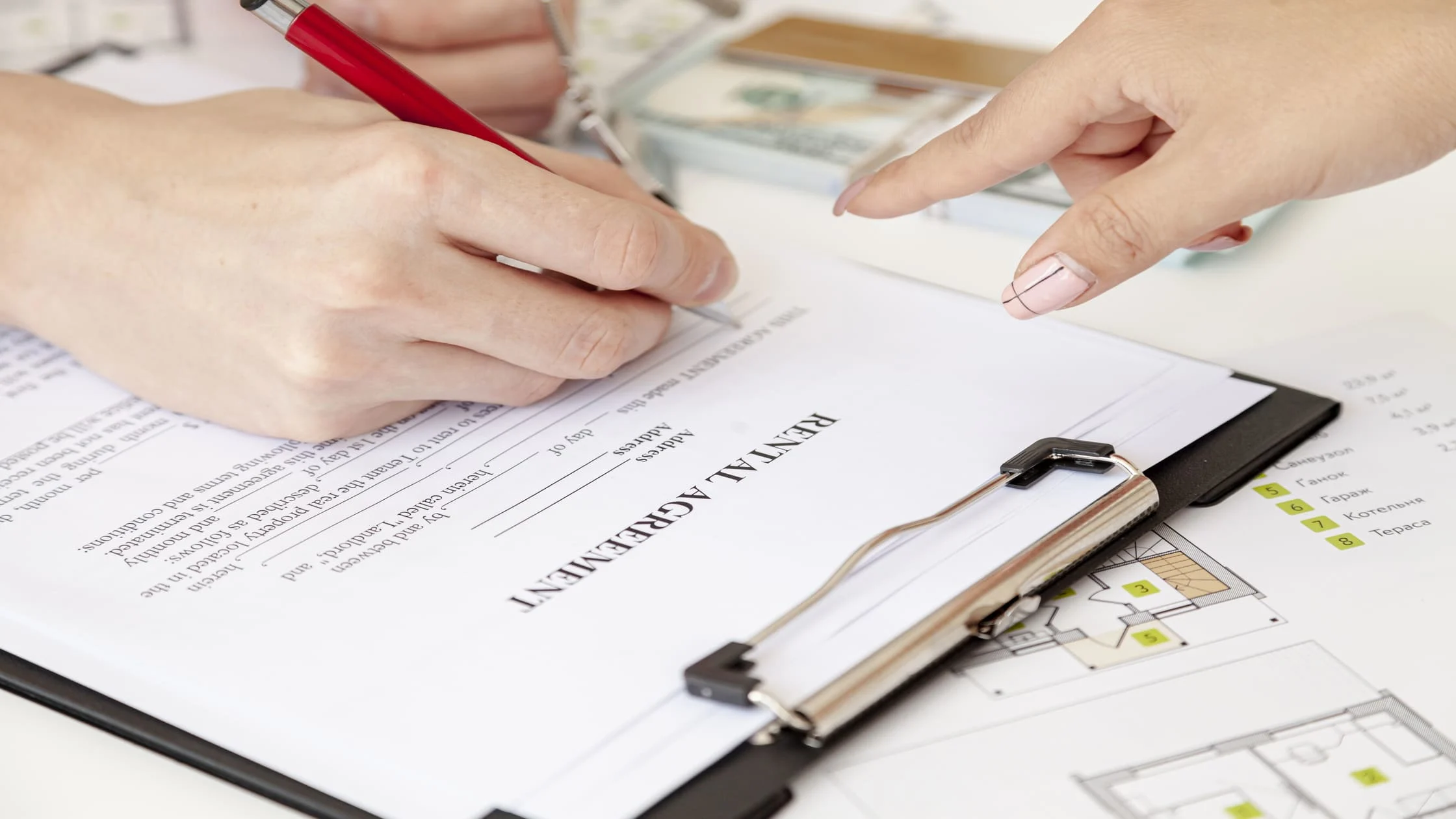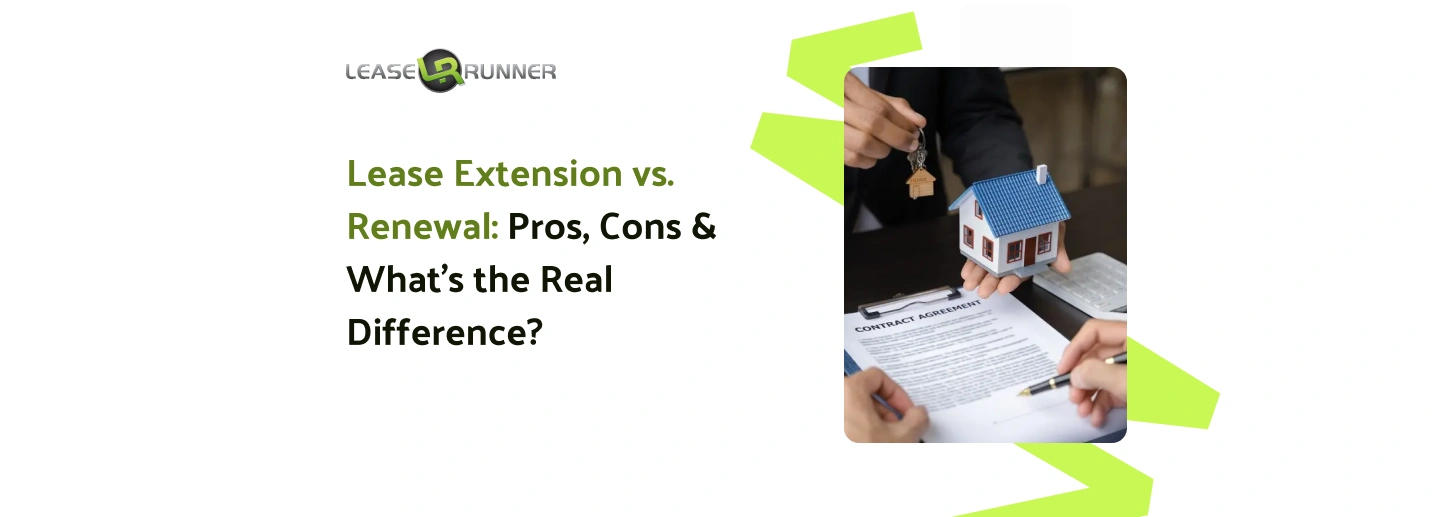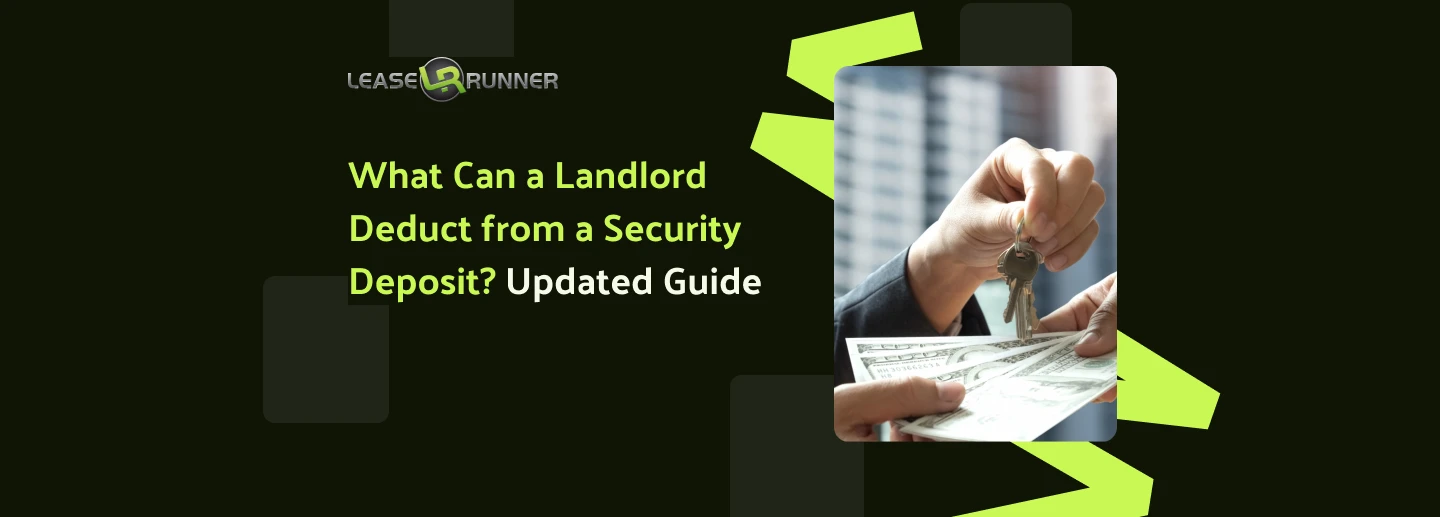Understanding the difference between lease extension vs renewal is important for landlords and tenants when managing rental properties. Lease extension and lease renewal are often confused, but they are not the same. Each has different effects on rental agreements.
This guide explains lease renewal. It also covers what extending a lease means,, and offers practical tips for landlords and tenants. If you need clear examples or if you're curious about renewing a leasehold, we’ll explain the pros and cons. We’ll also help you decide when to choose one option over the other.
You’ll learn about rental agreement extensions. You’ll also see the downsides of extending a lease. Plus, we’ve embedded key resources to help you navigate terms such as lease extension agreement and more.
Before we explore these details, here’s a quick facts table summarizing six of the most searched criteria related to lease extension vs renewal.
What is Lease Renewal?
A lease renewal occurs when a landlord and tenant agree to continue on as renters after the original lease term ends. The new lease can have the same terms or any revision to the rent, lease term, or rules.
In a lease renewal, parties commonly make changes to core terms - rent amounts, lease length or duration, and policies or rules. If only a small number of terms change, the landlord and tenant can deal with it without drafting a new lease altogether, with a lease addendum.
There are three primary variations to lease renewal.
- Automatic Renewal: Some leases, such as month-to-month rental agreements, renew without either party signing a new document. For example, if the tenant does not give a notice to vacate, the lease may extend for another month or even a year. This process keeps the tenancy simple and predictable.
- Negotiated Renewal: In this type, the landlord and tenant work together to agree on new terms. For instance, a landlord may suggest a rent increase or a longer lease term, while the tenant may request changes like updated appliances. This option is often best when market conditions shift.
- Renewal Options: Many leases include an option to renew clause, giving tenants the right—but not the obligation—to extend.
Tenants must usually send a written renewal notice within a set period. A tip: put this deadline on your calendar and review if the lease terms will remain the same. Missing the date means losing the right to extend, which can force a move or higher rent.
For example, a tenant's lease terminates on December 31. The landlord may offer a renewal lease commencing on January 1. The lease could have a different rent amount and rules and regulations. However, if only a rule or regulation changes, the landlord can follow through with an addendum.
Generally, understanding what lease renewal means helps landlords maintain their tenants for a longer leasing term and provides context for when changes to lease terms are required.
Tenants benefit from clear terms and peace of mind with a new lease that is enforceable between the parties. These transactions fit into a realm of tenant and landlord fairness and stability.

What is a Lease Extension?
A lease extension allows the landlord and tenant to continue the original lease for an additional period by executing a new, legally binding addendum. Other than the fact that the expiration date has been mutually extended, the original lease remains unchanged.
A lease extension agreement is the formal document that allows this extension. Both landlords and tenants must sign it to extend the lease term legally.
This approach is frequently taken when tenants only need a little “extra time” and neither the landlord nor the tenant wants to renegotiate terms or conditions, such as the rent. An extension reduces paperwork and administrative tasks. It does this by extending the original lease terms.
For example, if a tenant’s lease ends on June 30 but they need two more months, the landlord can extend the lease to August 31 with a signed extension agreement. The rent and other terms stay the same during this time.
Using a lease extension helps landlords keep tenants longer without extra work. Tenants get more time with clear terms and no surprises. This makes renting smoother for both sides.
Note: In California, understanding the lease extension vs renewal California laws is particularly important. There can be state laws about restricting increases in rent during extensions and the notice that may be required for renewal.
Lease Extension vs Renewal – Key Differences

This section breaks down the fundamental differences between lease extension vs renewal, examining them side by side in terms of agreement nature, terms, timing, purpose, and rent.
1. Nature of the Agreement
- Lease Renewal: Lease renewal terminates the original lease and replaces it with an entirely new lease agreement. Renewal is usually tenant-approved, and must agree to any new terms or rent. This renews the landlord-tenant relationship, with new terms.
- Lease Extension: A lease extension simply extends the existing lease. It doesn't expire and supersedes the initial lease. This amendment is typically executed by an addendum or an amendment, which is a legal means to amend the lease without making a new contract.
2. Terms and Flexibility
- Renewal: The two parties may amend the lease conditions. These can be rent, responsibilities, lease period, or regulations. The new lease has the amendments and should be signed and accepted by both parties.
- Extension: All of the initial conditions remain unchanged. Rent, regulations, and responsibilities remain unchanged as they were during the extension period. Only the lease expiration date advances.
3. Timing and Administrative Process
- Renewal: Generally written 30-90 days before the lease will expire. It involves writing a new lease and having it signed by both parties, along with legal documentation of the new agreement.
- Extension: A less formal, quicker process that can even be negotiated after the expiration of the lease. It involves an addendum or a change to the existing lease that is signed by both the landlord and tenant to ratify the extension.
4. Purpose and Use Cases
- Renewal: Function most effectively when the tenant intends a long-term occupation or the owner desires renegotiation of rent or lease terms. It ensures the repricing of the lease with new terms appropriate to current needs.
- Extension: Function for a brief additional time, like when tenants require additional time to relocate or owners don't wish to have a unit vacant. It prolongs the lease but doesn't negotiate terms or alter them.
5. Rent Adjustments
- Renewal: The lease conditions, such as the rent and other terms, can be renegotiated at renewal. Some of these are the amount of rent, lease duration, and duties of the landlord and tenant, policies, or rules. With this, landlords can revise the lease to match today's market rates and requirements.
- Extension: Rent typically remains the same as in the initial lease. However, if a rent adjustment is desired under an extension, it must be officially renegotiated, and sometimes a new agreement or addendum is required..
Suppose a tenant requires only two additional months; a lease extension is perfect because it preserves the existing rent and conditions without additional paperwork. That brief additional time prohibits renegotiation and hassle.
But should the tenant not wish to vacate after a year, a renewal of the lease is better. This allows the tenant and landlord space to negotiate and revise essential conditions like rent, lease duration, and rules to accommodate the longer stay..
Having explained the most substantial differences, let us proceed to review the merits and demerits of these options from the landlord's perspective.
Pros and Cons of Lease Renewal for Landlords

Lease renewals offer landlords a fresh opportunity to adjust lease terms, but also come with certain challenges.
Pros of Lease Renewal
- Increased Rent Potential: Landlords can adjust rent to reflect current market rates.
- Updated Lease Terms: Allow the addition of new rules or policies that better protect property interests.
- Long-Term Stability: Secures tenant occupancy under a fresh commitment.
- Clear Legal Framework: A new contract reduces ambiguity and clarifies obligations.
Cons of Lease Renewal
- Risk of Losing Tenants: Tenants will refuse higher rent or new terms, resulting in turnover.
- More Administration: Involves writing and signing a new lease, time and effort.
- Negotiation Difficulty: There is possible confusion among terms.
- Tenant Relation Stress: Adjustments disturb tenants who have been enjoying the original terms.
Landlords gain by weighing the pros and cons before negotiations. Tools like LeaseRunner help create new lease documents quickly. Next, we will explore the advantages and disadvantages of extending a lease instead.
Pros and Cons of Lease Extension for Landlords

A lease extension gives landlords a simple way to keep the same tenant for a short period, with little paperwork required. By using an extension, the landlord keeps the original lease agreement in place, only changing the end date. Let’s now look at the pros and cons of using a lease extension for landlords.
Pros of Lease Extension
- Simplicity: Requires less paperwork and faster agreement.
- Vacancy Prevention: Extends tenancy temporarily, reducing turnover gaps.
- Tenant Satisfaction: Provides tenants with flexibility, fostering goodwill.
- No Term Changes: No need to renegotiate or revise lease terms.
Cons of Lease Extension
- No Rent Increases: Landlords cannot capitalize on market rent changes.
- Fixed Old Terms: Bound to original lease conditions that might be outdated.
- Short-Term Solution: Extensions rarely guarantee long-term tenancy.
- Legal Restrictions: Some jurisdictions limit the duration or conditions of extensions.
Understanding these advantages and disadvantages helps landlords see when an extension is appropriate. Stability for tenants is very important, and an extension may provide this security. Also, if lease changes or higher rent aren't options, it’s important to consider extensions.
Both lease renewal and extension have their place depending on the landlord's goals and the tenant's needs. So how can one decide to choose between them? Let's check them out in the next part.
How to Decide Between Lease Extension and Renewal?
Choosing between a lease extension vs renewal depends on several key factors. Follow these simple steps to decide what works best for your property and tenant.
Step 1: Know What the Tenant Wants
Ask your tenant how long they want to stay.
- If they want to stay for a longer time and are open to new terms, choose a renewal. This lets you set new rent or rules.
- If they just need some extra short time, a lease extension is better. It simply extends the current lease without major changes.
Example: A tenant has a 12-month lease but needs 2 more months. You can offer a 2-month extension with the same rent.
Step 2: Check the Market
Look at local rents.
- If rents are higher now, a renewal can help you increase rent fairly.
- If rents are steady or going down, an extension keeps rent the same, reducing the risk of losing your tenant.
Example: Your rent was $1,500 a year ago. If market rent rose to $1,700, a renewal can update the rent. If not, keep the rent steady with an extension.
Step 3: Understand the Laws
Rent laws may limit rent increases.
- In places with rent control, renewals might have rules on how much you can raise rent.
- Extensions may allow you to keep the rent the same, avoiding legal issues.
Check your local laws to stay legal.
Step 4: Think About Your Time
Renewals need new paperwork and take more time. Extensions are usually simpler, just adding time to the old lease. If you're busy, extensions can save time and keep tenants happy.
Step 5: Look at Your Tenant Relationship
If your tenant has been good and pays rent on time, a simple extension might be enough. If there are issues or you want new rules, a renewal works better.
Example: You want to add a pet clause. A renewal lets you do that; an extension does not.
Step 6: Explain Options Clearly
Tell tenants the difference between extension and renewal.
- Extension: Same lease, more time.
- Renewal: New lease with possible changes.
Give tenants clear paperwork so nothing is confusing.
Step 7: Choose and Document
After considering all steps, choose extension or renewal. Sign a lease extension or new lease accordingly. This keeps things legal and clear.
When uncertain, clear communication with tenants about these options avoids misunderstandings. It protects your interests and supports good tenant relations.
Legal & Regional Considerations for Landlords
Before a decision can be made between a lease extension vs a renewal, the legal environment must be taken into consideration. Landlord-tenant law differs significantly from state to state and even city to city.
As an example, in California, a lease renewal and a lease extension have different rules. Landlords must give written notice before the lease ends, usually 30, 60, or 90 days, based on how long the tenant has lived there. This gives tenants time to prepare. Missing this notice can make the lease switch to month-to-month, which has different rules.
Many states and cities have rent control laws,. These limit how much rent can rise during renewals. Rent usually does not increase during extensions since the original terms remain. This is stricter than many other states with shorter notices or no rent control..
Renewing a leasehold, where tenants have use but not ownership, is more complex. It depends on the lease and local laws. New rents, dates, or rights may need negotiation. Lawyers often help landlords and tenants review contracts and avoid disputes.
Each area sets its own rules on notices, rent limits, and documents. Landlords should learn the laws where their property is. This helps avoid trouble and keeps tenants happy.
For clear steps on lease renewal, landlords can use our 2025 Renew a Lease Agreement guide. It covers notices, documents, and tenant communication.
Negotiation Tips for Landlords

Good negotiation skills help landlords get the best deals. When you know which one to choose between lease extensions vs renewals, you make fair deals that keep tenants happy. Here’s how to prepare and negotiate well.
Preparing Before Negotiation
Before talking to tenants, check their payment record. If they pay late or on time, this changes how you approach negotiations. Know the local rents in your area. This helps you set fair rent prices.
Set limits on rent changes. Decide the max rent increase you want. Plan how long you want the lease to last and learn what tenants want too. Are they looking for shorter or longer leases? Know the laws about rent and leases in your area. This keeps you safe and fair.
Setting Rent Adjustments Strategically
Rent adjustments should be carefully planned and communicated. Don’t raise rent too much at once. Big jumps make tenants leave. Instead, raise rent in smaller steps over time.
You can add small perks like free parking or fixing minor problems. Use lease renewals for rent change, as lease extensions usually keep the same terms.
Communicating Terms Clearly with Tenants
Clear communication of lease terms is fundamental to avoiding misunderstandings. Explain things simply. Tell tenants the difference between lease extensions and renewals.
Write down all lease terms. Use lease extension forms for extensions. Being clear will help landlords and tenants avoid confusion. Always say if you offer rent discounts or perks and how they affect the total rent. This makes tenants trust you.
Conclusion
This article defines lease renewal vs extension. It outlines their differences and lists the advantages and disadvantages for the landlord and the tenant.
It is important to understand what is lease renewal and what it means to extend a lease. It ensures the stakeholders make informed decisions. Landlords must maximize rental yields and occupancy by opportunistically deciding whether to renew or extend. They must take into account tenant demand, regulatory needs, and market conditions.
LeaseRunner makes leasing easy for landlords. It provides an easy way of drafting renewal contracts and addenda to rental agreements.
FAQ
What is the main difference between a lease extension and a lease renewal?
A lease extension prolongs the current lease under the same terms, while a lease renewal involves signing a new lease agreement, often with updated terms including rent and duration. Extensions keep the original lease intact; renewals replace it with a fresh contract.
Can a landlord increase rent during a lease extension?
Typically, no. Rent increases usually occur during lease renewals when new terms are negotiated. Lease extensions continue under the original lease terms, so rent remains the same unless otherwise agreed.
Can you renew a leasehold property lease?
Yes, but leasehold renewals can be complex and vary by local laws and original lease terms. It often requires legal assistance to navigate leasehold renewals properly. Always check your local regulations before proceeding.
What happens if a landlord fails to give notice before not renewing a lease?
If a landlord does not provide proper written notice—usually 60 to 90 days before lease expiration—the lease may automatically convert to a month-to-month agreement. This gives tenants more flexible rights and prolongs their stay without new lease terms.







